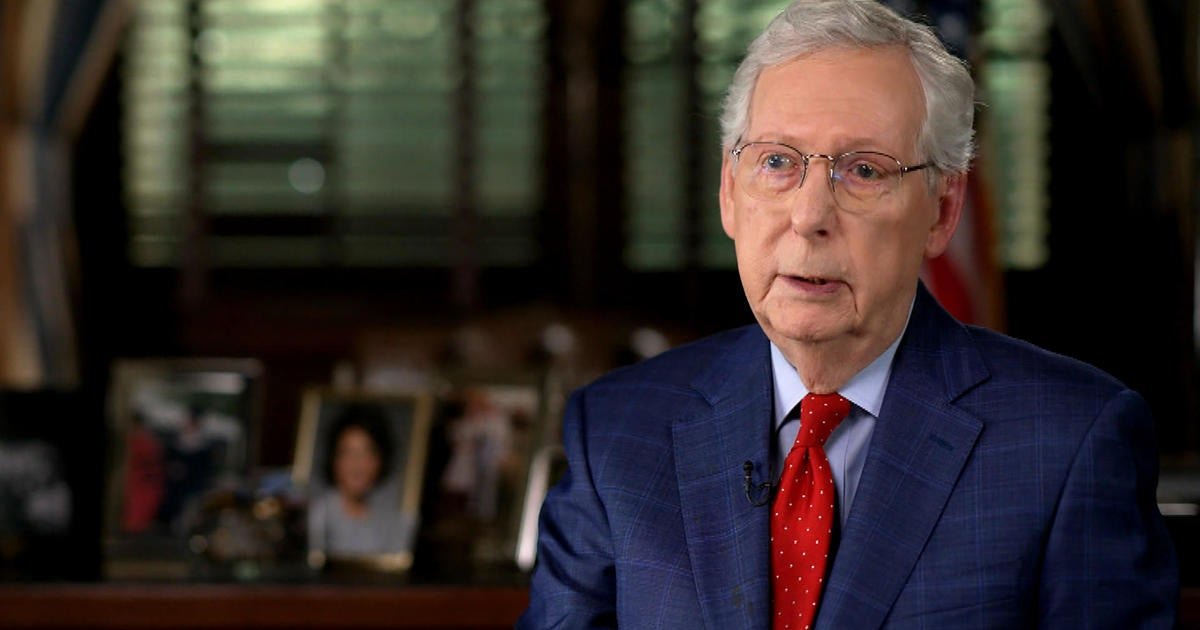When the longest-serving Senate leader in U.S. history stepped down at the end of the last Congressional term, the most significant legacy he left was not in the halls of the Capitol.
Instead, Sen. Mitch McConnell’s impact as leader of the Senate Republicans ripples throughout the judiciary. Under his leadership, the Senate confirmed three Republican-appointed Supreme Court justices and more than 200 lower-court judges, tilting the courts in favor of conservatives for a generation.
In a recent interview with 60 Minutes correspondent Lesley Stahl, McConnell said putting his focus on the judiciary was his way of attaining enduring influence.
“It’s a lifetime appointment,” McConnell said. “The normal legislative activities we involve in, they take over, taxes go up. We take over, taxes go down. In other words, it’s very hard to get any kind of lasting impact. I felt that the way to get lasting impact is to put the right kind of men and women on the courts who hopefully will be there for a while.”
What will likely also last a while is the controversy over how he did it.
When Justice Antonin Scalia died in February 2016, then-President Barack Obama nominated Merrick Garland to fill the seat. But before Obama could even announce Garland’s name, McConnell led Republican senators in saying they would refuse to even hold a hearing on any replacement. They claimed it was too close to the November election, nearly nine months away.
But when Justice Ruth Bader Ginsberg died just six weeks before the 2020 election, McConnell pushed through President Donald Trump’s nominee, Amy Coney Barrett, in one of the quickest Supreme Court confirmations in modern history.
At the time and again in his interview with Stahl, McConnell justified his actions by pointing to a speech former President Joe Biden gave in 1992. At the time, Biden was a senator, George H.W. Bush was president, and the election was only a few months away.
In the 1992 speech, Biden suggested that a president should not nominate a Supreme Court justice during an election year. Then the chairman of the powerful Senate Judiciary Committee, Biden hypothetically proposed that, should a Supreme Court seat be vacated that year, the Senate wait until after the November election to allow the voters to decide on the next president before confirming a nominee.
Biden’s idea was moot: the Supreme Court did not have a vacancy until after the election. The next seat was vacated when Justice Byron White retired a year after Biden made his speech, a seat Ginsberg would eventually fill.
In citing this so-called “Biden rule,” McConnell went on to argue that the 1880s were the last time a vacancy was created in a presidential election year and the Senate of a different party confirmed it.
But Senate Republicans did not even allow Garland’s nomination to get to a point where they could confirm or reject it. McConnell argues that he was legally allowed to do it — and to turn around and muscle through Barrett four years later. His justification came down to whether the party in power in the Senate was the same as that in White House.
“There’s nothing unconstitutional about it. It doesn’t break any rules,” McConnell told Stahl. “The majority decides whether to vote or not. And that’s why in 2020 we were in the majority. The president was of our party. The vacancy occurred, and we filled it.”
In his biography of McConnell, author Michael Tackett called McConnell’s blocking of Garland “brutish” and said the decision was an unusually impulsive one.
“This was the sheer exercise of power,” Tackett said. “That was a total concoction to give the gloss of authority for what he wanted to do.”
According to Tackett, McConnell and his wife were taking a vacation in the Caribbean when Scalia died. By the time McConnell was in his hotel room, Tackett said, he told his staff they had to put out a statement saying the seat would not be filled.
“He announces this rather impulsive decision,” Tackett said. “And then he realizes, ‘We have to have a rationale for that decision.’ So he tells his staff to, ‘Look at the history books. Find us a rationale, find us some justification for this argument.'”
According to Lawrence Friedman, a professor of privacy and constitutional law at New England Law, McConnell’s blocking of Garland went beyond a show of power—it was “arguably unconstitutional.” According to Friedman, the blockade “undermined both the letter and spirit of Article II, which states that the president ‘shall have the power’ to ‘nominate, and by and with the advice and consent of the Senate, shall appoint … judges of the Supreme Court.'”
In her conversation with McConnell, Stahl asked if the court he helped create is doing what he and his conservative allies hoped it would. McConnell said his motivation in creating a conservative supermajority on the Supreme Court was reigning in the administrative state, which refers to government agencies that establish, implement, and interpret their own regulations.
Recent Supreme Court decisions have addressed the power of federal agencies, including Loper Bright v. Raimondo, which was decided last year. With Loper Bright, a majority of justices rejected the established principle known as the Chevron deference, which held that courts should typically give weight to government agencies when interpreting the laws they enforce.
“This new Supreme Court reversed that,” McConnell said. “And that’s a message to Congress, that if you want us to do something, you better spell it out. And it’s also a message to the private sector, that if you think this agency doesn’t have the authority to do this, sue them and you might have a chance at winning.”
Another pivotal decision the Supreme Court has made recently was to overturn Roe v. Wade, and Stahl asked McConnell if that was one of his goals. The Kentucky senator responded that it did not matter what he thought.
“It’s a new political process now. And it’s playing out,” he said. “And the American people will have a chance to deal with it directly. The court basically said it’s up to the people who were elected to make these decisions.”
The video above was produced by Brit McCandless Farmer and edited by Scott Rosann.



